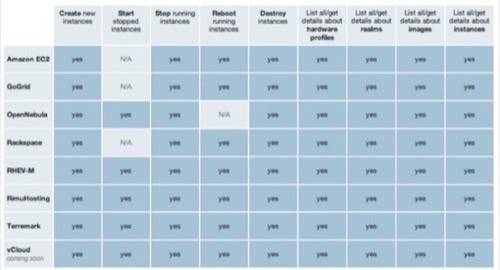As we wrote yesterday, the summer of 2010 has been marked in the cloud computing world by open-sourcing technologies and multi-vendor agreements.

We started the summer with OpenStack, the Rackspace and NASA open-cloud initiative. Earlier this week, Red Hat open-sourced its Deltacloud API.
Also this week, newScale, rPath, Eucalyptus Systems and Momentum SI teamed up to begin offering a self-service cloud.
We thought it might be a good time to take a brief look at the offerings, especially as more efforts like this are bound to unfold.
Deltacloud API
Red Hat announced this week that it is open-sourcing its Deltacloud API and has contributed it to the Apache Software Foundation. The API is compatible with all the major cloud service providers. The move is significant. Red Hat is a company associated with open-source. By offering Deltacloud as a standard, it provides a window for RedHat to market its stack more effectively to the enterprise.

It also breathes new life into Deltacloud. Red Hat had announced Deltacloud last year as an ecosystem that can work across public and private clouds. It was touted for its portability but customers did not buy it. It seemed like a lock-in. Now it is really out in the open where it can be used by any service provider. And that plays to Red Hat and its core value as a service provider.
newScale, rPath, Eucalyptus Systems and Momentum SI
The companies announced a coalition this week that offers the enterprise an “on-ramp” to private and hybrid cloud computing. Eucalyptus provides the infrastructure, newScale serves as a portal environment and rPath automates the software and systems deployment and maintenance. MomentumSI will handle the implementation.
Mike Vizard makes the point that IT departments and end users never really learned how to share. Historically, companies have allocated resources to applications. Sharing resources is a new behavior that an on-ramp may help encourage.
OpenStack
OpenStack may have the best shot of all the open cloud initiatives. It is supported by NASA and Rackspace. About 30 companies have joined the effort.
Rackspace is making a huge bet on OpenStack. Cloudkick CEO Alex Polvi wrote on GigaOm that Rackspace has overnight transformed itself from a hosting company to a development shop. That’s a gamble but the early signs show promise in the bet.
The code is there to attract developers. The software is licensed under Apache. Rackspace says that at any one time there are 130 to 140 developers are in the IRC channel. Patches are being made to the code which is encouraging as it shows that there is community participation in the project.
Community is driving the OpenStack effort. Companies joining OpenStack include Citrix and new services such as Opscode, which developed Chef. Rackspace has developed an iPad app, which is based on an app Racskpace developed earlier this year. According to Mike Mayo, “the app uses the OpenStack compute and storage APIs to help you manage your cloud resources, and offers a few features outside of the scope of the APIs, such as viewing RSS system status feeds, pinging your compute nodes from several locations around the world, and emailing files from OpenStack Object Storage.”
Further, it integrate with Opscode and Chef, automating the manual process of configuration that is required when setting up a node on the iPad.
The community is what sets OpenStack apart from the other efforts. It has the code base but more so there is an excitement about developing an open cloud infrastructure.
Deltacloud is an open API that has deep integration capabilities but we will have to see what kind of community involvement develops.
Eucalyptus and its partners have a compelling offering but these kinds of coalitions will pop up more frequently. They are effective but not unique.
Our bet is on OpenStack. The summer has passed and it continues to gain momentum. It may stall but our bet is the community will keep this effort ongoing for quite some time.

















